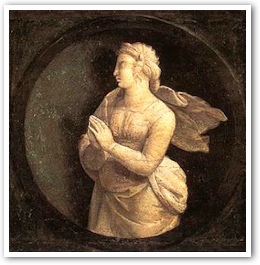Christ the Anointed One
- FR. KENNETH BAKER, S.J.
We bear the name Christians and are followers of Our Lord Jesus Christ. Let us concentrate for a few moments on the name Christ which became, in the first years after the Resurrection of the Lord, his proper name.
 |
For, in the Creed we profess our belief "in one Lord, Jesus Christ".
The word "Christ" is the English transliteration of the Greek word Christos which means "the anointed one". This Greek word, in turn, is a translation of the Hebrew and Aramaic Messiah which also means "anointed". During Lent we frequently see advertisements for performances or records of Handel's Messiah. So "Christ" and "Messiah" mean the very same thing.
The practice and notion of "anointing" are found in the Old Testament books of Samuel and Kings. These books recount the beginnings, history and disappearance of the kings of Israel, beginning with Saul, David and Solomon, and ending with the destruction of Jerusalem in 587 B.C., and the enslavement of the Jewish people by the Babylonians.
King David and his descendants were all anointed in their office as head and leader of the Chosen People. Scripture refers to the king as the "anointed of Yahweh". He was, therefore, a sacred person who, in a way, represented the kingship of Yahweh over his people. The people also believed that God worked through the king to protect them and to achieve his special plan.
When the kingdom is destroyed, the faithful began to look into the future for the Messiah (Christ) who would deliver them and establish an everlasting kingdom. The theological basis for this hope is the promise of the prophet Nathan contained in 2 Samuel (7:13), and repeated in Psalm 89 (28-29). I suggest that you take down your Bible and read these two passages.
In the course of time the title "Christ" underwent many changes, but we know for sure that at the time of Jesus it was understood mainly in a political and not a theological sense. The feeling of the Messiah's imminent arrival was very intense.
Jesus himself was reserved in his attitude to the title. He forbade the demonics to say he was the Messiah (Lk 4:41); he told the twelve Apostles not to say that he was the Christ (Mt 16:20). The reason was that he did not want the people to get the wrong, political idea about his messiahship. His efforts were directed to give the title a transcendent, heavenly meaning. Finally, during his passion, when asked directly by the Jewish authorities, he admits that he is the Messiah (Mk 14:60-62). That was one of the reasons why they put him to death.
After the Resurrection, the first believers used the title "Christ" to sum up all the other titles. Gradually, what was once just a title became practically a proper name. Thus St. Paul, in his writings, is constantly referring to the Lord as "Jesus Christ" (cf. 1 Cor 1:1-9). The title-name was so important that within a few years the followers of Jesus of Nazareth were designated by it. "It was at Antioch that the disciples were first called 'Christians'" (Acts 11:20).
See the index of chapters from Fundamentals of Catholicism which have been reprinted to CERC here.
 This is Meaghen Gonzalez, Editor of CERC. I hope you appreciated this piece. We curate these articles especially for believers like you.
This is Meaghen Gonzalez, Editor of CERC. I hope you appreciated this piece. We curate these articles especially for believers like you.
Please show your appreciation by making a $3 donation. CERC is entirely reader supported.

Acknowledgement
Kenneth Baker, S.J. "Christ the Anointed One." In Fundamentals of Catholicism Vol. 1 Chapter 10 (San Francisco: Ignatius Press, 1995), 40-42.
This article reprinted with permission from Father Kenneth Baker, S.J.
The Author

 Father Kenneth Baker, S.J., assumed editorship of Homiletic & Pastoral Review in April 1971 and remained in this position for almost forty years. In 1983 he published a three-volume explanation of the faith called Fundamentals of Catholicism Vol. 1, Creed and Commandments; Vol. 2, God, Trinity, Creation, Christ, Mary; and Vol. 3, Grace, the Church, the Sacraments, Eschatology
Father Kenneth Baker, S.J., assumed editorship of Homiletic & Pastoral Review in April 1971 and remained in this position for almost forty years. In 1983 he published a three-volume explanation of the faith called Fundamentals of Catholicism Vol. 1, Creed and Commandments; Vol. 2, God, Trinity, Creation, Christ, Mary; and Vol. 3, Grace, the Church, the Sacraments, Eschatology




